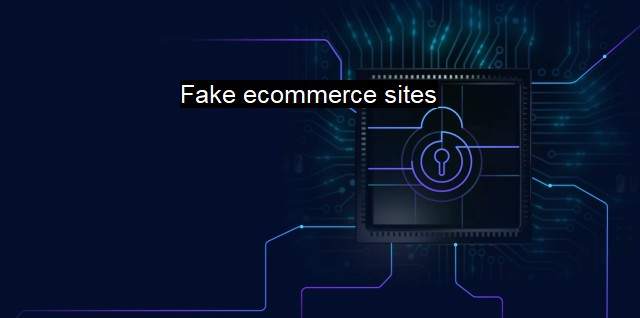What are Fake ecommerce sites?
The Dangers of Fake Ecommerce Sites: How to Protect Yourself using Cybersecurity and Antivirus Solutions
Fake ecommerce sites refer to illegitimate online shops designed to mimic credible online shopping platforms. Operated by cybercriminals, these websites aim to steal sensitive data such as credit card information, banking details, or identity information from unsuspecting consumers.These fake ecommerce sites are carefully designed to present themselves as credible and professional retail outlets. High-quality graphics, favourable reviews, and apparently secure payment options draw in many unsuspecting customers. cybercriminals camouflage these sites using elements that online buyers are usually drawn to, such as competitive prices and extensive product catalogs. Some even go a step further by incorporating fake social media handles to add a layer of legitimacy known to increase consumer trust.
Many fake ecommerce sites capitalize on recognized brands. They tout sought-after products at astonishingly low prices, creating an irresistible lure for many online shoppers. The effect this has on the brands themselves is another grave concern as they lose not only potential sales but also the trust and reputation they built over the years.
The modus operandi for these illegitimate sites is typically to entice consumers into making online transactions. instead of later shipping the products to the buyer, the criminals extract and misuse the payment credentials and personal information shared during the transaction process.
More advanced operators even create elaborate check-out procedures involving multiple phishing pages. These ventures entice consumers further down a dangerous rabbit hole, extracting more essential information such as email addresses, phone numbers, and even supposed security questions. The extracted information can then be used to execute more sophisticated scams, including identity theft or as part of larger-scale cybercrime operations.
Fake ecommerce sites represent a significant cybersecurity threat that permanent antivirus solutions need to monitor. Antivirus software must exhibit robust capabilities to detect these malicious websites and block access, protecting consumers’ information stored on the system from being exposed.
Traditional protection measures include using complex passwords, ensuring your device is equipped with trusted security software, and regularly updating the system with the latest protection against viruses and malware. the degree of sophistication shown by these fake sites means that consumers also need to be proactive weapons in this fight.
Awareness of online safe practices is a strong defense against ecommerce scams. Consumers should thoroughly research unfamiliar ecommerce sites before making transactions, use secure payment methods, be wary of outrageously low-priced products, and ensure URLs begin with 'https' to signify a secure shopping experience. Online shoppers would also benefit greatly from studying the telltale signs of dangerous websites, such as checking if the site has contact information or credible customer feedback.
On a broader commercial scale, businesses and corporations need to invest heavily in sophisticated and comprehensive antivirus and cybersecurity strategies to guard against these threats. These strategies should include constantly monitoring internet traffic for deception patterns, spam alerts, and using advanced AI technologies to minimize the potency of such scams.
While dealing with fake ecommerce sites can be complex, it undeniably highlights the importance of robust cybersecurity and antivirus measures in safeguarding online commercial activities. As online shopping continues to expand, so do the threats linked to malicious ecommerce platforms. Consumers, businesses, and security software developers need to stay abreast of the emerging threats and tighten their defense against cyber-attacks like these fake sites. Only then could we all navigate the enigmatic, promising world of ecommerce with confidence.

Fake ecommerce sites FAQs
What is a fake ecommerce site?
A fake ecommerce site is a website that appears to be a legitimate online store but is actually built to trick people into providing their personal information and credit card details.How can I identify a fake ecommerce site?
You can identify a fake ecommerce site by looking for signs such as poor web design, low-quality product images, suspicious URLs, and misspellings or grammatical errors on the website.What are the dangers of using a fake ecommerce site?
The dangers of using a fake ecommerce site include the risk of credit card fraud, identity theft, and malware infections. Cyber criminals can use the information you provide on these sites to make fraudulent purchases and steal your money or personal information.How can I protect myself from fake ecommerce sites?
You can protect yourself from fake ecommerce sites by using a reputable antivirus software that can detect and block malicious websites. Additionally, you should always verify the legitimacy of the website before making a purchase, use secure payment methods, and avoid clicking on suspicious links or downloading attachments from unknown sources.| | A | | | B | | | C | | | D | | | E | | | F | | | G | | | H | | | I | | | J | | | K | | | L | | | M | |
| | N | | | O | | | P | | | Q | | | R | | | S | | | T | | | U | | | V | | | W | | | X | | | Y | | | Z | |
| | 1 | | | 2 | | | 3 | | | 4 | | | 7 | | | 8 | | |||||||